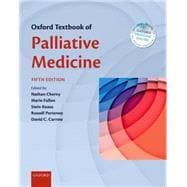The Oxford Textbook of Palliative Medicine is the definitive text in the field of palliative medicine. The fifth edition has been thoroughly revised and updated, offering a global and comprehensive perspective on this rapidly developing speciality.
The multi-disciplinary nature of palliative care is emphasized throughout the book. As palliative care has become an established specialty, there is the need for the evidence-base to match other areas of clinical medicine. Ethical and communication issues are explored and the treatment of symptoms is comprehensively covered, with particular focus on the management of pain. The book also includes specific chapters devoted to the role of palliative care in non-malignant diseases and conditions, whilst education and training are highlighted as critical to future best practice.
The fifth edition, available both in print and online, is edited by established leaders in the field. The text provides over 100 chapters written by over 200 international authors, making this a truly comprehensive and global text which no hospital, hospice, palliative care service, or medical library should be without.








